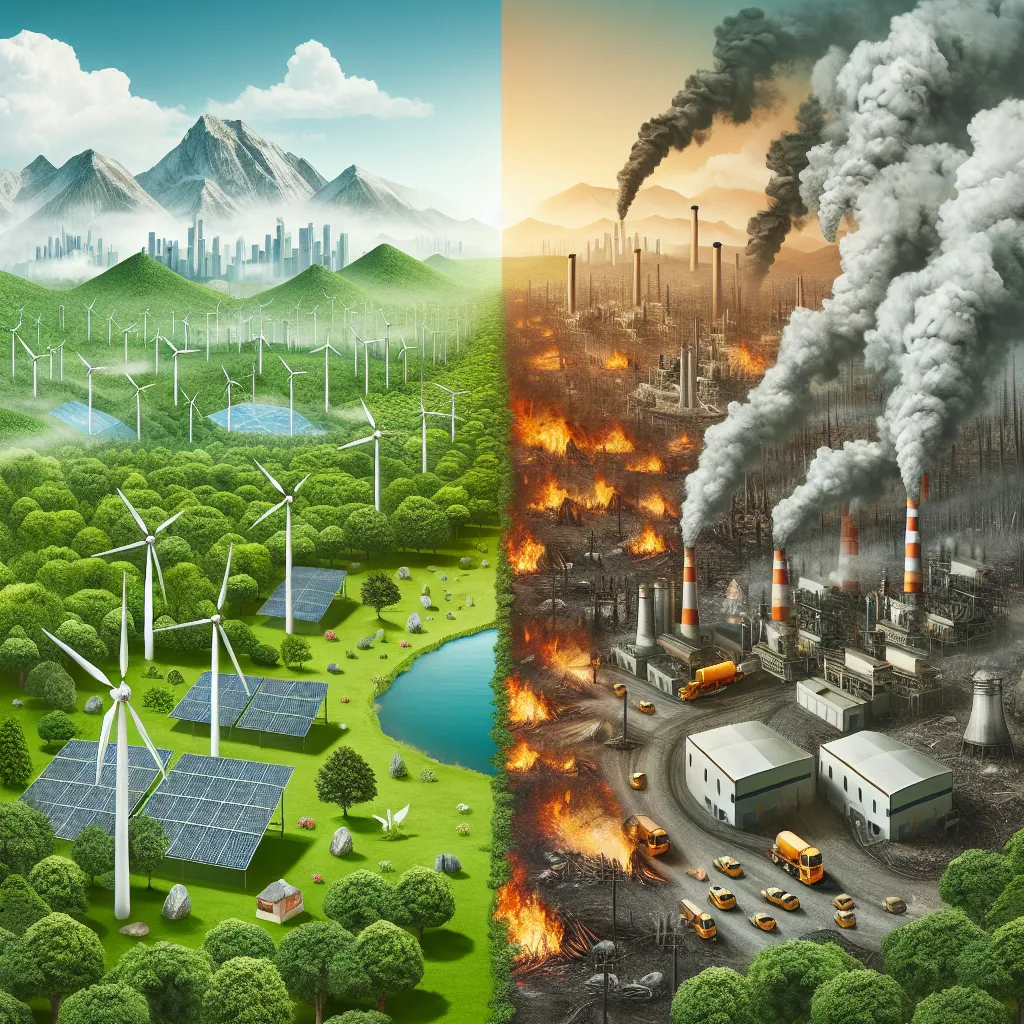Climate change and its impact on economic development is a crucial topic that frequently appears in IELTS Writing Task 2. Based on recent trends and the increasing global focus on environmental issues, we can expect this theme to remain prevalent in future IELTS exams. Let’s explore a specific question related to this topic and analyze how to craft a high-scoring essay.
 Climate change affecting economy
Climate change affecting economy
Analyzing the Question
Here’s a sample question that reflects the type of task you might encounter:
Some people believe that economic growth is necessary to solve environmental problems, while others argue that economic growth is actually the cause of these problems. Discuss both views and give your own opinion.
This question requires you to:
- Discuss the view that economic growth can solve environmental problems
- Discuss the opposing view that economic growth causes environmental problems
- Present and justify your own opinion on the matter
Sample Essay (Band 8-9)
Here’s a high-scoring sample essay addressing the question:
In the ongoing debate about the relationship between economic growth and environmental issues, two contrasting viewpoints have emerged. While some argue that economic prosperity is essential for tackling environmental challenges, others contend that it is the root cause of these problems. This essay will examine both perspectives before presenting my own stance on this complex issue.
Proponents of economic growth as a solution to environmental problems argue that technological advancements and innovation, which are often driven by economic development, can lead to more sustainable practices. They believe that as countries become wealthier, they have more resources to invest in clean energy, efficient waste management systems, and environmental conservation. For instance, developed nations have been at the forefront of renewable energy adoption and have implemented stricter environmental regulations. Additionally, economic growth can facilitate the transition to a knowledge-based economy, potentially reducing reliance on environmentally damaging industries.
On the other hand, critics argue that economic growth, particularly when pursued without consideration for environmental consequences, is the primary driver of ecological degradation. They point to the increased consumption of natural resources, higher levels of pollution, and accelerated climate change that often accompany rapid economic expansion. The pursuit of profit and short-term economic gains can lead to the exploitation of natural resources and the neglect of long-term environmental sustainability. Moreover, the globalized nature of modern economies means that environmental costs are often externalized, with poorer nations bearing the brunt of environmental damage caused by the consumption patterns of wealthier countries.
In my opinion, while unchecked economic growth can indeed exacerbate environmental problems, sustainable economic development is crucial for addressing these issues effectively. The key lies in decoupling economic growth from environmental degradation through the adoption of circular economy principles, investment in green technologies, and the implementation of robust environmental policies. By prioritizing sustainable development goals and fostering innovation in clean technologies, we can create a model of economic growth that not only mitigates environmental harm but actively contributes to ecological restoration and conservation.
In conclusion, the relationship between economic growth and environmental problems is nuanced and complex. While unrestrained economic expansion can lead to severe environmental consequences, a well-managed, sustainable approach to economic development can provide the resources and innovations necessary to tackle environmental challenges effectively. The path forward lies in striking a balance between economic progress and environmental stewardship, ensuring a prosperous and sustainable future for all.
(Word count: 392)
Sample Essay (Band 6-7)
Now, let’s look at a sample essay that would score in the Band 6-7 range:
There are different opinions about the connection between economic growth and environmental problems. Some people think that economic growth can help solve environmental issues, while others believe it causes these problems. I will discuss both sides and give my opinion.
Those who support economic growth say that it can help the environment. They think that when countries have more money, they can spend it on new technologies that are better for the environment. For example, rich countries can invest in clean energy like solar and wind power. Also, with more money, governments can make better laws to protect nature and reduce pollution. Some people argue that as economies grow, they move away from polluting industries to cleaner service-based jobs.
On the other hand, many people believe that economic growth is bad for the environment. They say that when economies grow, people use more resources and create more waste. This leads to problems like deforestation, air pollution, and climate change. For instance, as countries develop, more people buy cars and use electricity, which increases pollution. Critics also point out that companies often focus on making money quickly without thinking about the long-term effects on the environment.
In my opinion, I think that economic growth can be good for the environment if it is done in the right way. We need to find a balance between growing the economy and protecting nature. This means using new technologies that are environmentally friendly and making laws that encourage businesses to be more sustainable. Countries should focus on “green growth” that creates jobs in clean industries.
To conclude, while economic growth can cause environmental problems, it can also provide solutions if managed correctly. The key is to ensure that as economies grow, they do so in a way that respects and protects the environment. This approach can lead to both economic prosperity and a healthier planet.
(Word count: 318)
Key Points to Remember When Writing
-
Structure: Both essays follow a clear structure with an introduction, body paragraphs discussing each viewpoint, the writer’s opinion, and a conclusion. The Band 8-9 essay demonstrates more sophisticated paragraph development and cohesion.
-
Vocabulary: The higher band essay uses more advanced vocabulary and collocations (e.g., “ecological degradation”, “externalized”, “decoupling”). The Band 6-7 essay uses simpler language but still effectively conveys the main ideas.
-
Grammar: The Band 8-9 essay showcases a wider range of complex structures, while the Band 6-7 essay uses simpler constructions but maintains grammatical accuracy.
-
Task Response: Both essays address all parts of the question, but the higher band essay provides more detailed examples and a more nuanced analysis.
-
Coherence and Cohesion: The Band 8-9 essay demonstrates better use of linking words and phrases, creating a more fluid argument.
Essential Vocabulary for This Topic
-
Sustainable development (noun) /səˈsteɪnəbl dɪˈveləpmənt/ – Economic development that meets present needs without compromising future generations.
-
Renewable energy (noun) /rɪˈnjuːəbl ˈenədʒi/ – Energy from sources that are naturally replenished, like wind or solar power.
-
Carbon footprint (noun) /ˈkɑːbən ˈfʊtprɪnt/ – The amount of carbon dioxide emissions associated with an individual, organization, or product.
-
Ecological balance (noun) /ˌiːkəˈlɒdʒɪkl ˈbæləns/ – A state of equilibrium between living organisms and their environment.
-
Green economy (noun) /griːn ɪˈkɒnəmi/ – An economy that aims for sustainable development without degrading the environment.
-
Resource depletion (noun) /rɪˈsɔːs dɪˈpliːʃn/ – The consumption of natural resources faster than they can be replenished.
-
Biodiversity (noun) /ˌbaɪəʊdaɪˈvɜːsəti/ – The variety of plant and animal life in a particular habitat or ecosystem.
-
Climate mitigation (noun) /ˈklaɪmət ˌmɪtɪˈgeɪʃn/ – Actions to reduce the severity of climate change impacts.
-
Circular economy (noun) /ˈsɜːkjələr ɪˈkɒnəmi/ – An economic system aimed at eliminating waste and the continual use of resources.
-
Environmental stewardship (noun) /ɪnˌvaɪrənˈmentl ˈstjuːədʃɪp/ – Responsible use and protection of the natural environment through conservation and sustainable practices.
In conclusion, the impact of climate change on economic development is a complex and crucial topic in IELTS Writing Task 2. By understanding the key arguments, using appropriate vocabulary, and structuring your essay effectively, you can craft a compelling response to questions on this theme. Remember to practice writing essays on related topics, such as the role of government in environmental protection, the impact of climate change on coastal communities, or how climate change affects global trade. These practice sessions will help you develop the skills and confidence needed to tackle any question on this subject in your IELTS exam.
We encourage you to try writing your own essay on the question provided in this article. Share your essay in the comments section below for feedback and discussion with other learners. This active practice is an excellent way to improve your writing skills and prepare for success in the IELTS Writing Task 2.


